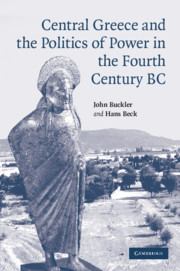Book contents
- Frontmatter
- Contents
- List of maps
- Preface
- Acknowledgments
- List of abbreviations
- Prologue
- Part I ALLIANCE
- Part II HEGEMONY
- Chapter 6 The re-establishment of the boiōtarchia (378 BC)
- Chapter 7 The battle of Tegyra, 375 BC
- Chapter 8 Plutarch on Leuctra
- Chapter 9 Alliance and hegemony in fourth-century Greece: the case of the Theban Hegemony
- Chapter 10 Xenophon's speeches and the Theban Hegemony
- Chapter 11 The phantom synedrion of the Boeotian Confederacy, 378–335 BC
- Chapter 12 Boeotian Aulis and Greek naval bases
- Chapter 13 Epaminondas and the new inscription from Cnidus
- Part III DOMINATION
- Epilogue
- Glossary
- References
- Index
Chapter 13 - Epaminondas and the new inscription from Cnidus
from Part II - HEGEMONY
Published online by Cambridge University Press: 22 September 2009
- Frontmatter
- Contents
- List of maps
- Preface
- Acknowledgments
- List of abbreviations
- Prologue
- Part I ALLIANCE
- Part II HEGEMONY
- Chapter 6 The re-establishment of the boiōtarchia (378 BC)
- Chapter 7 The battle of Tegyra, 375 BC
- Chapter 8 Plutarch on Leuctra
- Chapter 9 Alliance and hegemony in fourth-century Greece: the case of the Theban Hegemony
- Chapter 10 Xenophon's speeches and the Theban Hegemony
- Chapter 11 The phantom synedrion of the Boeotian Confederacy, 378–335 BC
- Chapter 12 Boeotian Aulis and Greek naval bases
- Chapter 13 Epaminondas and the new inscription from Cnidus
- Part III DOMINATION
- Epilogue
- Glossary
- References
- Index
Summary
The appearance of a Theban fleet of a hundred triremes in the Aegean Sea in 364 BC has always been an anomaly in the history of the Theban ascendancy. From the liberation of the Cadmea in 379 to the battle of Mantinea in 362 the Thebans had consistently pursued a land strategy, first against the Spartans and later against the Athenians, who had come to the aid of the enemy. In 367/6 Pelopidas won the support of the King for a Common Peace, which, however, was never ratified. Yet a connection with Persia had been made. Moreover, this diplomatic failure did not retard work on the Theban fleet, nor did it entail a break between Persia and Thebes. The usual strategy of the Persians for dealing with the eastern Aegean was to finance a Greek fleet as an agent of their policy in the area. The King and his satraps had employed both Athenian and Spartan fleets during the Ionian War and had provided Conon with the means to defeat the Spartans at the battle of Cnidus in 394. Themselves lacking the huge resources necessary for naval warfare, the Thebans needed foreign funds with which to build a fleet, and the only realistic source for them was the King.
Diodorus is the principal, but not the only, source for these events. His testimony (15, 79, 1) is terse enough to be quoted in full:
The people immediately decreed to build a hundred triremes and dockyards to accommodate them, and to urge Rhodes, Chios, and Byzantium to assist their schemes (boēthēsai tais epibolais). Epaminondas himself, who had been dispatched with a force to these cities, so overwhelmed the Athenian general Laches, who had a considerable fleet and had been sent out to circumvent the Thebans, that he forced him to withdraw, and he made the cities Thebes' own (idias tas poleis tois Thēbaiois epoiēsen).
- Type
- Chapter
- Information
- Publisher: Cambridge University PressPrint publication year: 2008



